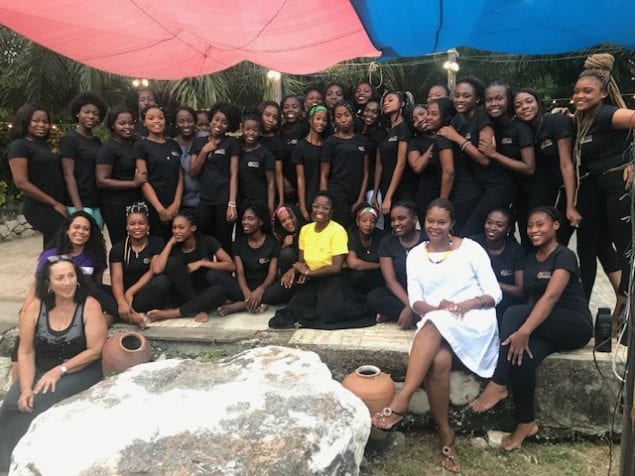
After months of the worst civil unrest in Haiti in years — widespread protests against the government, gang violence, tire burning, road blockages, sexual assault — 35 girls and young women found relief and hope this summer during a 10-day retreat designed for holistic support and education.
Sponsored by the Women and Girls Initiative (WGI), the girls from the most poverty-stricken and oppressed areas of Haiti receive tuition to attend school during the year and to participate in the WGI Leadership Academy in the summer.
Under the umbrella of Partners-In-Health, WGI was founded by Didi Bertrand-Farmer, now a member of St. Thomas Episcopal Church in Coral Gables. Drawn by the stories of the remarkable work that WGI accomplishes, parishioners at St. Thomas for the past three years have designated their major fundraiser for outreach to WGI’s work in Haiti.
On Shrove Tuesday last spring, the community was invited to a Crepe Dinner with live music, Haitian dancers, WGI’s Mobile Art exhibit, arts and crafts from Haiti for purchase, and opportunities to sponsor scholarships.
This summer’s Leadership Academy responded to the needs of the girls at the end of a particularly traumatic year. All of them went through the earthquake of 2010 and some through Hurricane Matthew in 2016, both natural disasters leaving unimaginable devastation that thousands of families are still dealing with (last year, almost 38,000 people still lived in displacement camps from the 2010 earthquake).
The increased violence beginning in July 2018 and continuing throughout this year locked down the country at various times, making food scarce and hunger severe. Daily life was unsafe. Girls attending girls’ schools were especially targeted by gangs, and as a precaution, most of these girls had to go to school in street clothes, changing to their uniforms once they arrived.
The majority of the 35 girls this summer had been personally impacted by the recent violence. In the opening days of the retreat, as they shared their stories in the “listening space” of small groups, they learned to talk about what had happened to them, listen to each other, cry together, and support each other. Several had been violently attacked on the street in robberies.
A second-year nursing school student, leaving the hospital late one night with three student friends, had been raped. Another had watched her best friend killed in front of her, and her brother had been shot.
The curriculum for the 10 days used a holistic approach offering emotional and mental health support, education, art therapy, and a vision of hope for the future of Haiti and the role of women. Two Haitian attorneys, both women, talked to them about human rights violations and avenues for change.
A doctor from Partners-In-Health (PIH) dealt with possible ways to prevent sexual abuse and what to do after sexual abuse, if it occurs, to prevent HIV and unintended pregnancy.
The Development Officer for PIH in Haiti taught and helped them reflect on the future of Haiti regarding education, the environment, and politics.
Workshops in the arts helped the girls express themselves through writing, drawing, and dance. A two-day workshop on writing poetry, led by young Haitian author Melissa Beralus, helped them give voice to their anguish and their hope. Some of the girls had a natural gift for the written word and could create lines like those of one 19-year-old that include (when translated into English):
I, lil’ girl of the ghetto,
I grew up amongst laughter and tears…
Laughter I held while drinking a snow cone,
while eating grilled peanuts…
Tears that I wished were mine alone
rather than those of girls like me.
Whether they were natural poets or not, all of the girls found an inner voice to speak some of their deepest, most intimate realities and find some healing in doing so.
For three days, dance workshops were held in the morning and drawing workshops in the afternoon, all workshops led by professional artists. By the end of the time, each girl had created a collage self-portrait on the topic of “personal strength” — images and symbols of who she was now in terms of strength and who she wanted to become. With pictures clipped from magazines and their own personal drawing and writing, they expressed ideas, feelings, and growing confidence and hope bubbling up from deep within them.
Bertrand-Farmer plans to have the poetry and collages made into a book in 2020 for the 10th anniversary of the earthquake.
The work of WGI in Haiti, our neighbor to the south, is life-changing and eventually, it is hoped, will be country-changing. St. Thomas feels genuinely privileged to be able to help support this work.






